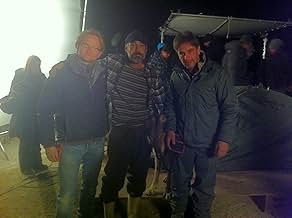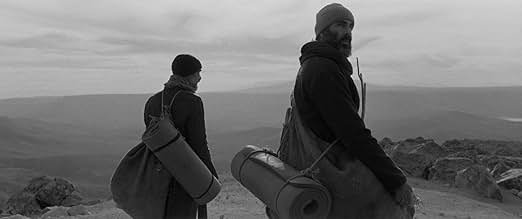IMDb-BEWERTUNG
6,1/10
1713
IHRE BEWERTUNG
Füge eine Handlung in deiner Sprache hinzuPost-apocalyptic world divided between city remnants and agricultural zones, both ruled by corporations and elites. Survivors navigate stratified society after an unspecified cataclysmic eve... Alles lesenPost-apocalyptic world divided between city remnants and agricultural zones, both ruled by corporations and elites. Survivors navigate stratified society after an unspecified cataclysmic event, inspired by a chapter from the Noble Quran.Post-apocalyptic world divided between city remnants and agricultural zones, both ruled by corporations and elites. Survivors navigate stratified society after an unspecified cataclysmic event, inspired by a chapter from the Noble Quran.
- Regie
- Drehbuch
- Hauptbesetzung
- Auszeichnungen
- 7 Gewinne & 5 Nominierungen insgesamt
Grigory Dobrygin
- Andrei
- (as Grigoriy Dobrygin)
Empfohlene Bewertungen
It is surprising how a modern era film can carry so much misogynism.
Overall the pacing of the film is torpid. That and the misogyny in several of the textual quotes proves an unpleasant cinematic experience.
Overall the pacing of the film is torpid. That and the misogyny in several of the textual quotes proves an unpleasant cinematic experience.
To define it as a remarkable film, many reasons can be used. The most important is the state of soul after its final credits. A film about life and fundamental options. A film about faith and about goodness. About questions and about the high price of answers. A film about the return and the way and the bag of grains , a burning tree reminding the meet between God and Moses, the voice of child in night and his invitation to dinner and, not the last, the powerful memories about "Stalker" by Andrei Tarkovski. Sure, I admit, the temptation , before see the movie, is the names of Semih Kapanoglu and Jean- Marc Bar . i do not know if it is a masterpiece. But , for me, it is not far by this definition. So, only "Bugday".
The film takes its main topic from a famous story of Moses the prophet. All of the film is black-and-white. Locations are impressive, especially the old building in Anatolia. The best thing about the film is that film blends post-apocalypse and Islamic mysticism. The fictional world of film is also very good. The concept of breath used well in the film as a symbol of truth and soul. The main character, trying to make a choice between grain (all physical things) and breath. Thus, the director tells the audience about the choice process of people between the physical and metaphysical world. The film includes a perfect criticism of materialism in the background. The film bears the well stamp of the sci-fi genre. Like all other Semih Kaplanoglu movies, you can feel the taste of delicious drama in the film. Lastly, the performance of actors is excellent, they add a sincere mood to the film.
The director Semih Kaplanoglu has a succesful cinema discography. His last film "Grain" is raising his cinematographic level to top!
Grain presents an excellent visual narration making feel the taste of Bela Tar, Andrei Tarkovsky, Pawel Pawlikowsky or Alfonso Cuaron movies. Also, by the context of dark storytelling and using mystic-religious references to tell a distopic story, the movie evokes Darren Aronofsky movies. However, these tastes signify only evoking materials; Kaplanoglu has achieved a genuine and peculiar cinema langue containing authentic, local and oriental images and narratives some of which refer to Kur'an.
Only disturbing content of movie, especially for me, Grain present an open-ended expression on the contradiction/combination of science and spiritual-religious beliefs within the story of an apocalyptic future where people strive against scarsity and poverty. Hence, some of possible interpretations can radically change main suggestions of the movie and many viewers (like me) could dislike some of these conclusions. The director's ideo-political position (close to actual political power in Turkey) may give some clues on what he has tried to express by his movie but, looking for the meaning out of this movie could lead us to false notions.
Despite this, I loved this movie very very much.
Grain presents an excellent visual narration making feel the taste of Bela Tar, Andrei Tarkovsky, Pawel Pawlikowsky or Alfonso Cuaron movies. Also, by the context of dark storytelling and using mystic-religious references to tell a distopic story, the movie evokes Darren Aronofsky movies. However, these tastes signify only evoking materials; Kaplanoglu has achieved a genuine and peculiar cinema langue containing authentic, local and oriental images and narratives some of which refer to Kur'an.
Only disturbing content of movie, especially for me, Grain present an open-ended expression on the contradiction/combination of science and spiritual-religious beliefs within the story of an apocalyptic future where people strive against scarsity and poverty. Hence, some of possible interpretations can radically change main suggestions of the movie and many viewers (like me) could dislike some of these conclusions. The director's ideo-political position (close to actual political power in Turkey) may give some clues on what he has tried to express by his movie but, looking for the meaning out of this movie could lead us to false notions.
Despite this, I loved this movie very very much.
'Grain' (the Turkish title is 'Bugday'), the 2017 film by Turkish director Semih Kaplanoglu is a beautiful film and at the same time a dense and difficult one. We are dealing with an ecological parable that can be described as being somewhere at the intersection between science fiction and the theological-philosophical discourse, a film with a special aesthetic and numerous references in text, image and composition that often requires browsing through personal repository of cultural, literary and cinematic knowledge of the viewer. It is this permanent intellectual and aesthetic challenge that makes the film's message seem not to be at the top of the director's interest. 'Grain' risks becoming a film from which in a year or ten years from watching we be remembered more for visual quotes than for ideas.
The post-apocalyptic world in which the story takes place is familiar from many other films: a deserted planet with islands of relative stability protected by armed soldiers and deadly fences and arid areas where the rest of the survivors wander in rags. The cause of this apocalypse is an ecological catastrophe generated by genetically engineered crops, which have practically destroyed living species on the Earth's surface. The hero of the film, Erol (Jean-Marc Barr), a scientific researcher employed by the corporation that controls the artificial crops tries to determine the exact causes of the disaster and find a solution. The key to the enigma can be, perhaps, found in the theory developed by another former employee of the company, Cemil (Ermin Bravo), who has taken refuge in the deserted area. Erol will embark on a dangerous journey that will take him though the devastated areas of the planet, in search of his former colleague and of truth.
Most of the film describes the hero's pilgrimages on the destroyed planet where no form of life survives more than three generations at most. If the post-apocalyptic landscape resembles that of other films, cinematography is completely differently. The combined effect of using black and white and wide screen is spectacular and dramatic. 'Grain', an international production, was filmed on three continents, with urban scenes filmed in the United States while the natural ones, for the most part, use the landscapes of Asian Turkey. Erol's pilgrimages through the devastated areas, as well as his quests in which science combines with mysticism, are reminiscent of 'Stalker' and it is no coincidence that Semih Kaplanoglu is a great admirer of Tarkovsky. Quotes abound in this film, in which the Turkish director seems to have wanted to pay homage to many of the sources that inspired him, from the Qur'an and the Bible (the little girl discovered in the basket on the shore, the burning tree in the desert) to the name of the guide Alice (Cristina Flutur), the one who has the power to cross the forbidden borders between the worlds. Visual metaphors intertwine with those in the words spoken by the characters. The aesthetic effect cannot be disputed, but neither can the sensation of repetition and length. Unlike many other films that sound the alarm about the risks of genetic engineering, 'Grain' does not choose the more commercial means of expression such as horror or action films, but rather picks the most difficult ones of poetic and religious metaphors. When people try to play God by meddling in the mysteries of creation, solutions and salvation may also come from the direction of the sacred.
The post-apocalyptic world in which the story takes place is familiar from many other films: a deserted planet with islands of relative stability protected by armed soldiers and deadly fences and arid areas where the rest of the survivors wander in rags. The cause of this apocalypse is an ecological catastrophe generated by genetically engineered crops, which have practically destroyed living species on the Earth's surface. The hero of the film, Erol (Jean-Marc Barr), a scientific researcher employed by the corporation that controls the artificial crops tries to determine the exact causes of the disaster and find a solution. The key to the enigma can be, perhaps, found in the theory developed by another former employee of the company, Cemil (Ermin Bravo), who has taken refuge in the deserted area. Erol will embark on a dangerous journey that will take him though the devastated areas of the planet, in search of his former colleague and of truth.
Most of the film describes the hero's pilgrimages on the destroyed planet where no form of life survives more than three generations at most. If the post-apocalyptic landscape resembles that of other films, cinematography is completely differently. The combined effect of using black and white and wide screen is spectacular and dramatic. 'Grain', an international production, was filmed on three continents, with urban scenes filmed in the United States while the natural ones, for the most part, use the landscapes of Asian Turkey. Erol's pilgrimages through the devastated areas, as well as his quests in which science combines with mysticism, are reminiscent of 'Stalker' and it is no coincidence that Semih Kaplanoglu is a great admirer of Tarkovsky. Quotes abound in this film, in which the Turkish director seems to have wanted to pay homage to many of the sources that inspired him, from the Qur'an and the Bible (the little girl discovered in the basket on the shore, the burning tree in the desert) to the name of the guide Alice (Cristina Flutur), the one who has the power to cross the forbidden borders between the worlds. Visual metaphors intertwine with those in the words spoken by the characters. The aesthetic effect cannot be disputed, but neither can the sensation of repetition and length. Unlike many other films that sound the alarm about the risks of genetic engineering, 'Grain' does not choose the more commercial means of expression such as horror or action films, but rather picks the most difficult ones of poetic and religious metaphors. When people try to play God by meddling in the mysteries of creation, solutions and salvation may also come from the direction of the sacred.
Wusstest du schon
Top-Auswahl
Melde dich zum Bewerten an und greife auf die Watchlist für personalisierte Empfehlungen zu.
- How long is Grain?Powered by Alexa
Details
Box Office
- Weltweiter Bruttoertrag
- 74.017 $
- Laufzeit2 Stunden 8 Minuten
- Farbe
- Seitenverhältnis
- 2.35 : 1
Zu dieser Seite beitragen
Bearbeitung vorschlagen oder fehlenden Inhalt hinzufügen

Oberste Lücke
By what name was Grain - Weizen (2017) officially released in Canada in English?
Antwort




























